|
|
|
Sort Order |
|
|
|
Items / Page
|
|
|
|
|
|
|
| Srl | Item |
| 1 |
ID:
118015
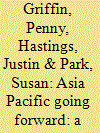

|
|
|
|
|
| Publication |
2013.
|
| Summary/Abstract |
As one of the preeminent academic conferences on international studies in the Asia Pacific, the 2012 Oceanic Conference on International Studies, held at the University of Sydney (with co-sponsors at the University of New South Wales, the University of Technology, Sydney, and Macquarie University) from 18 to 20 July, played host to a large number of academics and international analysts who presented research on a variety of international studies topics. After a very successful conference in Auckland that emphasized the connection of the OCIS community to the Oceanic region, it seemed fitting that the conference would come to Sydney, the largest city in the Oceanic region, and one of the premier global cities in the Asia Pacific. In part because of the location of the conference, and because of the emphasis of many of the conference presentations on the Asia Pacific, no doubt inspired by underlying trends that are both exciting and worrying (sometimes at the same time), the organizers decided to focus this special issue of Global Change, Peace and Security on the challenges that the Asia Pacific faces, now and in the future. In short, this special issue is about the Asia Pacific going forward.
|
|
|
|
|
|
|
|
|
|
|
|
|
|
|
|
| 2 |
ID:
145982


|
|
|
|
|
| Summary/Abstract |
International society, so long the resolution to problems of collective political order, now appears to be failing in its capacity to deal with transnational challenges such as climate change, global security and financial instability. Indeed, the structure of international society itself has become a significant obstacle to such pressing issues of global governance. One striking response has been the reemergence of cities as important actors on the international stage. This article will show how these two issues are intrinsically linked. Cities have taken on new governance roles in the gaps left by hamstrung nation-states, and their contribution to an emerging global governance architecture will be a significant feature of the international relations of the 21st century. But do the new governance activities of cities represent a failure on the part of states, as some scholars have argued? Or are they a part of an emerging form of global order, in which the relationship between states, cities and other actors is being recalibrated? This article argues that the remarkable renaissance of cities in recent decades has been a result of a shift in the structure of international society, and assesses the causal drivers of this shift. It goes on to draw out some of the implications of the recalibration of the relationship between the city and the state for how we understand the emerging form of global order.
|
|
|
|
|
|
|
|
|
|
|
|
|
|
|
|
| 3 |
ID:
132342
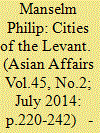

|
|
|
|
|
| Publication |
2014.
|
| Summary/Abstract |
Global cities are almost by definition somewhat detached from their geographical hinterlands. Cosmopolitan and modern, they are open to external influences from other cultures and from overseas trade. But they are also vulnerable to the rise of nationalism in the country which surrounds them, as is shown by the fate of three famous cities of the Levant, Alexandria, Smyrna and Beirut. They were multicultural trading cities, linking the economies of Europe and Asia, "windows on the world", in contrast to inland capitals like Cairo Ankara and Damascus. New global cities like London, Hong Kong and Dubai also have hybrid and polyglot inhabitants, like Levantine cities of bygone days. But they will need support if their cosmopolitanism is to prevail over nationalism.
|
|
|
|
|
|
|
|
|
|
|
|
|
|
|
|
| 4 |
ID:
112463
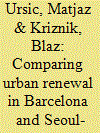

|
|
|
|
|
| Publication |
2012.
|
| Summary/Abstract |
Cities have become increasingly autonomous economic and political actors which actively respond to the pressures and opportunities of globalisation. Consequently, the urban management of any particular city is often based on the assumption that the city can improve its position against rival cities by efficiently managing its strategic resources and promoting its presumed advantages. Though such an approach to urban management may help cities to improve their global competitiveness and the quality of their residents' everyday life, it can sometimes result in negative consequences at the local level, thus actually narrowing the development prospects of the cities in the end. This article discusses urban management against the backdrop of the competitive urban policy in Barcelona and Seoul, and compares the local consequences of urban renewal in both cities. Based on a comparison of the two cases of urban renewal, 22@ Activity District in Barcelona and the Cheonggyecheon restoration in Seoul, this article argues that, in conditions of competition among global cities, even very different approaches to urban management and urban renewal may result in similar consequences at the local level.
|
|
|
|
|
|
|
|
|
|
|
|
|
|
|
|
| 5 |
ID:
090906
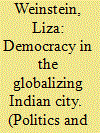

|
|
|
|
|
| Publication |
2009.
|
| Summary/Abstract |
Transformations under way in Indian cities have begun to alter the opportunities for democratic participation among the urban poor. Highlighting efforts to promote globally oriented urban developments in Mumbai, this article examines the state's engagement with groups directly impacted by these efforts. Based on ethnographic research and interviews with key stakeholders in the Dharavi Redevelopment Project (DRP), the article traces the character of such engagements over the project's four-year planning process. It finds that the state undertook an unusually inclusive process, consulting with resident and activist groups at points throughout this period. The article posits that this novel engagement is an unintended consequence of pressures to promote rapid development and ease investor concerns. Situating this case in the recent literature on political shifts in the globalizing Indian city, it concludes that the state may be engaging more with the urban poor than many of these accounts suggest.
|
|
|
|
|
|
|
|
|
|
|
|
|
|
|
|
| 6 |
ID:
114994
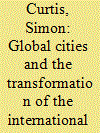

|
|
|
|
|
| Publication |
2011.
|
| Summary/Abstract |
The emergence of a new urban form, the global city, has attracted little attention from International Relations (IR) scholars, despite the fact that much progress has been made in conceptualising and mapping global cities and their networks in other fields. This article argues that global cities pose fundamental questions for IR theorists about the nature of their subject matter, and shows how consideration of the historical relationship between cities and states can illuminate the changing nature of the international system. It highlights how global cities are essential to processes of globalisation, providing a material and infrastructural backbone for global flows, and a set of physical sites that facilitate command and control functions for a decentralised global economy. It goes on to argue that the rise of the global city challenges IR scholars to consider how many of the assumptions that the discipline makes about the modern international system are being destabilised, as important processes deterritorialise at the national level and are reconstituted at different scales.
|
|
|
|
|
|
|
|
|
|
|
|
|
|
|
|
| 7 |
ID:
190342
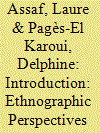

|
|
|
|
|
| Summary/Abstract |
This introduction offers a general framework to this Special Section which aims to unpack the ambivalences of cosmopolitanism in the Gulf region. It argues that cosmopolitanism is a heuristic concept for the critical analysis of extreme urban diversity in non-Western, non-democratic contexts. Indeed, it acts as a tool for exploring the tensions between logics of exclusion –– underlined by policies that maintain foreign residents outside of the citizenry –– and logics of integration, triggered partly by the competition among global cities to attract talents. While this introduction outlines the many theoretical debates surrounding the notion of cosmopolitanism, the five articles adopt an empirically-grounded approach to display new interdisciplinary perspectives on cosmopolitanism in Gulf societies, based on two overarching observations. First, they deconstruct state narratives of cosmopolitanism as a normative political discourse, with its lexicon of tolerance, diversity and coexistence. Second, they advocate for an understanding of cosmopolitanism built upon the study of individual representations, trajectories, and practices rather than as an ideal of coexistence and openness to the other.
|
|
|
|
|
|
|
|
|
|
|
|
|
|
|
|
| 8 |
ID:
134159
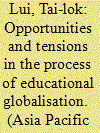

|
|
|
|
|
| Publication |
2014.
|
| Summary/Abstract |
With the rise of Asian economies, university education in the region is no longer just a service to be consumed domestically. It is also perceived as an industry for a rising global city. How to capture the growing market and make the best use of such an opportunity for city building is now on the agenda of many cities in Asia. Hong Kong is a particularly interesting case as it is both a destination for many talented students from China and a bridge for international students to reach different parts (China in particular) of Asia. Educational globalisation seems to make sense politically as well as economically. Yet how to strike a balance between opening the door of universities to the outside world and meeting the education needs of the local population is by no means unproblematic. At stake are further changes in the universities, and major challenges to the political capacity of the government which has to turn higher education into a revenue generating service without doing it at the expense of local interests.
|
|
|
|
|
|
|
|
|
|
|
|
|
|
|
|
| 9 |
ID:
137729
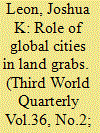

|
|
|
|
|
| Summary/Abstract |
Key trends link a globally connected urban archipelago and its hinterlands, warranting new studies of power in its most contemporary forms. This article locates land power and where that power is exercised – looking at the burgeoning global land rush from the perspective of cities. Urbanisation continues to drive vast political transitions, uprooting longstanding agrarian modes of living while creating myriad inequalities within cities. Are the world’s most powerful agglomerations active agents in this transformation? Answering affirmatively, the article reframes urbanisation as a vast, global geopolitical transfer of power from rural to urban. Leading global cities like New York, London, Hong Kong, Chicago and Singapore are not merely impressive collections of factor endowments. They are also sites of concentrated power with coercive influences beyond municipal boundaries. The article asks how cities project power in the contemporary global system. Juxtaposing data on global connectivity with the location strategies of private firms, we learn that the world’s most successful global cities are also sources of exploitative accumulations of land.
|
|
|
|
|
|
|
|
|
|
|
|
|
|
|
|
| 10 |
ID:
098649
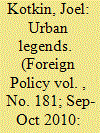

|
|
|
|
|
|
|
|